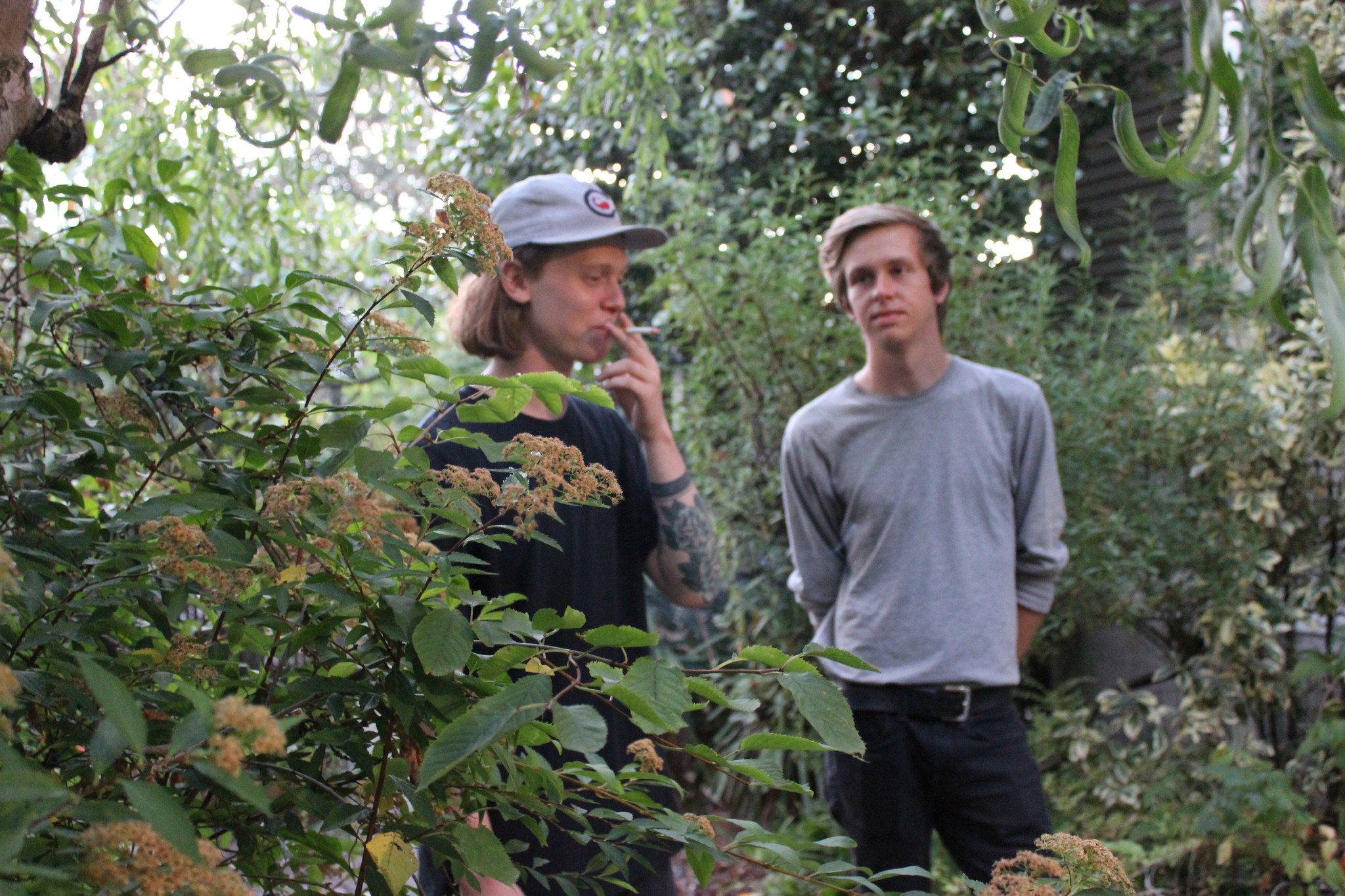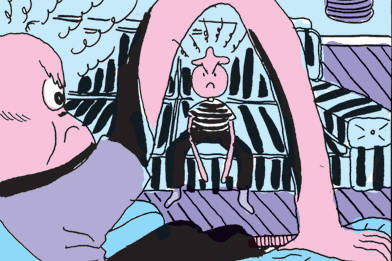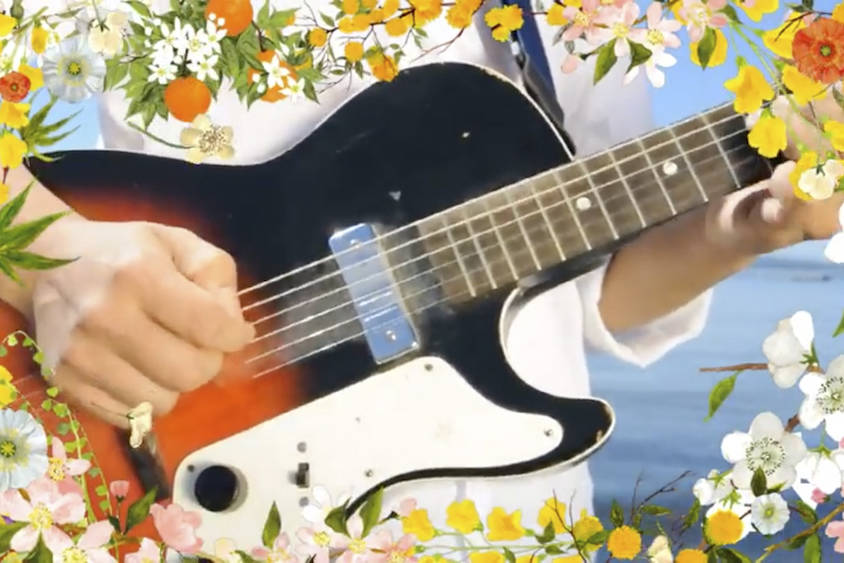A week ago, the folks behind Jungle Gym Records wrote, recorded, mastered, and designed cover art for a new tape in a single day. Believe it or not, the tape sounds great. One of their favorite tracks they’ve ever put out, a tune off Tommy X’s Her Luv from January, was recorded live on the spot in a Mac Photo Booth video, from which Jungle Gym ripped the tinny audio, doing their best to master it. Believe it or not, that tape also sounds great. It’s a little thin, for sure, but it brims with confident, laid-back swagger, like most of the label’s releases.
“It’s just fun to blast out music,” says label contributor and in-house sound engineer Jared Carrigan. “I love the idea of someone discovering our Bandcamp a month ago, then coming back and there’s three new releases.”
“A lot of times people will send us something you can tell they’ve worked really long and hard on with all these overdubs,” label founder, graphic designer, and contributor Caleb Draves says, “and it’s like, ‘OK, this isn’t quite there for Jungle Gym, but send us some demos—some stuff where you were just fucking around and have no idea what happened.’ We’re more interested in that.”
In a little over a year, the two 22-year-olds behind the Seattle-based label and the core five to eight members who contribute music to it have built a small international house and techno empire by simply “fucking around.” The label’s approach—purposefully mysterious, incredibly loosey-goosey, and almost comically prolific (16 releases in 12 months)—runs counter to everything you might expect would lead to a label’s success. But in fact, Jungle Gym Records was rewarded handsomely for its unusual, off-the-cuff tactics almost immediately after putting out its first tape. (More on that later.)
The core philosophies that serve as the guiding conceptual foundation of Jungle Gym Records began to foment two years ago when Carrigan and Draves were both in school at the University of Minnesota. Draves, a native of Berlin … Wisconsin, had moved to Minneapolis to study experimental media and play bass in Carrigan’s surf-rock band Holographic Sands. Both quickly grew tired of the rock scene in town—one mired in what they call “cock-rock male egos,” an obsession with tired classic-rock tropes, and lackadaisical community support.
“Even if you’re really good, you have to beg people to come to your shows,” Carrigan says. “I was just like, ‘This is so boring.’ It was like, ‘Why am I even doing it?’ So I just decided to make music in my bedroom.”
Carrigan, a self-admitted maximalist, began making overworked, “meaningless” music on his computer, a result of digital music software’s unlimited possibilities. That changed when Draves introduced him to one of his art professors, Ryan Wurst, the founder of experimental noise label Always Human Tapes. “That label is insane,” Draves says; “they’ve been around for two years and are pushing 100 releases. Ryan’s process—planning something, starting it, doing it, then finishing it really quickly and moving on—really influenced us.”
Around the same time, one of Carrigan’s childhood friends, a mysterious backpacker who goes only by Nate, showed up out of the blue and showed Carrigan and Draves some music he’d been making on his travels. The duo, who had only just been getting into the electronic-music world thanks to Wurst’s left-field taste, were blown away by Nate’s effortless, adventurous house ditties, made on the go using a dinky Korg EM-1 groovebox. The 1999 all-in-one machine, with its two synth part/eight drum part maximum capacity and built-in 144-sound library, taught Draves and Carrigan the freedom in limitation—the opposite of their experience with computers. The plasticky little box would become Jungle Gym’s “trademark” machine—almost half the label’s tapes were made almost exclusively on one. “He was like, just hit play, start the tape, and maybe you’ll end up with something amazing,” Carrigan says of the live, improvised feel Nate and his process brought.
Draves, restless at school and eager to drop out, began conceptualizing his own electronic-music label. He wanted something that would incorporate Wurst’s prolific “start it, do it, finish it” mentality and Nate’s less-is-more, live, one-take improv approach—an oddity in a scene often defined by meticulously sequenced, on-the-grid songwriting. In another 180-degree flip from Carrigan and Draves’ experiences in the rock world, they also decided they would never beg anyone to listen to their music, never do promotion, and cut out the ego by releasing work from their small group of collaborators (including the backpacking Nate—somewhere in Europe now, whom they haven’t been able to contact in months—and fellow Holographic Sands member Tyler Losinski) under a number of different aliases, obfuscating who is responsible for what.
Realizing there wasn’t much of an appetite for the music they wanted to make in Minneapolis, the group, minus Nate, packed up and moved to Seattle on a whim a year ago. They were drawn mostly by the water, which they say has influenced the relaxed, light, liquid mood of many of their releases—a stark contrast to the city’s prevailing dark, hard techno scene. “Very little of this stuff is designed or meant for the club,” Carrigan says of Jungle Gym’s breezy, borderline-ambient house catalog. Take Congo River Club House’s Free Jazz EP, which the duo call the “quintessential Jungle Gym tape,” cut from a two-hour jam session the label crew recorded using the EM-1, a chintzy toy Yamaha synth, and a bass guitar after Nate came over one day and “lit some incense to set the mood.” “Canopies,” one of the record’s standout tracks, is more fit for daydreaming than dancing—the musical equivalent of a lazy summer inner-tube float.
Soon after the group put out its first release—Directions, a tape by René Najera (an alias of Carrigan’s)—they were flooded by an avalanche of demos from producers the world over (and still are). They quickly added the Russia-based Bessiekat; Willrijk; Marco Lazovic; Vancouver, B.C.’s Minimal Violence; and the Chilean Daniel Klauser, all based on their similar philosophical approach to house and techno. After their second release, a compilation titled Black Summer Tape, major underground electro label Lobster Theremin, based in London, offered to distribute and pay for all their 12-inch records. “We were just like, ‘Is this a joke?’” says Draves.
“It was kind of the opposite experience of our surf band,” Carrigan says: “quick release, no promotion, way more people listening.”
In a few weeks, just a year after founding the label, Draves and Carrigan are preparing to head to Europe for their first live Jungle Gym tour, bolstered by the overwhelming support they’ve received from their numerous transatlantic connections. But they aren’t letting this get to their heads. True to Nate and Wurst’s teachings, Carrigan has spent almost every day recording and churning out one-take improv EM-1 songs—thousands of them—which Draves (who also just put out a tape this month under his alias Dravier) dutifully culls from time to time to curate and cherry-pick tracks for new Jungle Gym releases.
“That’s all we want to do for the foreseeable future,” Carrigan says. “Here’s a release, here’s a release, here’s a release.” Jungle Gym Patio Show with Rene Najera, Dravier, Goetic Mirror. Timbre Room, 1809 Minor Ave. E., timbreroom.com. Free, 21 and up, 7-11 p.m. Fri., Sept. 2.
Check the label out at junglegymrecords.bandcamp.com.
music@seattleweekly.com








